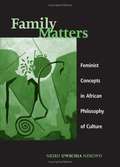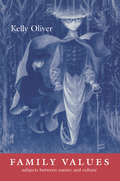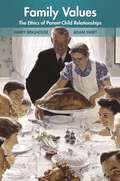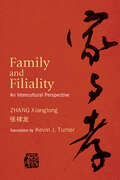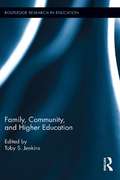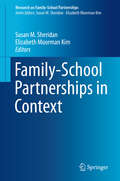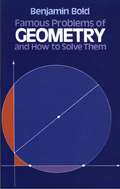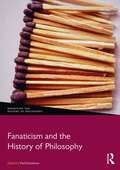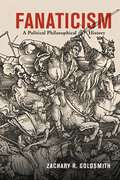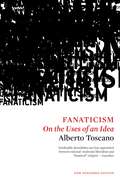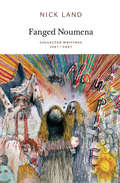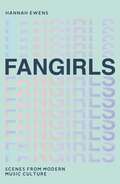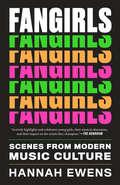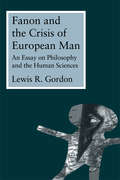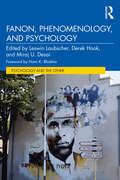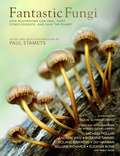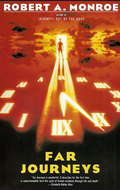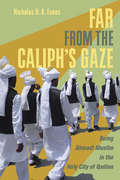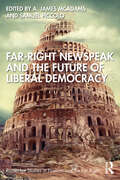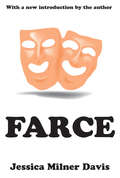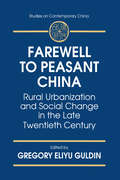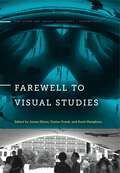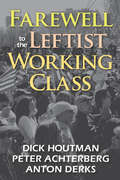- Table View
- List View
Family Matters: Feminist Concepts in African Philosophy of Culture
by Nkiru Uwechia NzegwuCharts new trends in gender studies through a compelling analysis of Igbo society.
Family Values: Subjects Between Nature and Culture
by Kelly OliverFamily Values shows how the various contradictions at the heart of Western conceptions of maternity and paternity problematize our relationships with ourselves and with others. Using philosophical texts, psychoanalytic theory, studies in biology and popular culture, Kelly Oliver challenges our traditional concepts of maternity which are associated with nature, and our conceptions of paternity which are embedded in culture. Oliver's intervention calls into question the traditional image of the oppositional relationship between nature and culture, maternal and paternal. Family Values also undercuts recent returns to the rhetoric of a "battle between the sexes" by analyzing the conceptual basis of these descriptions in biological research and the presuppositions of such suggestions in philosophy and psychoanalysis. By developing a reconception of maternity and paternity, Family Values offers hope for peace in the battle of the sexes.
Family Values: The Ethics of Parent-Child Relationships
by Adam Swift Harry BrighouseThe family is hotly contested ideological terrain. Some defend the traditional two-parent heterosexual family while others welcome its demise. Opinions vary about how much control parents should have over their children's upbringing. Family Values provides a major new theoretical account of the morality and politics of the family, telling us why the family is valuable, who has the right to parent, and what rights parents should—and should not—have over their children.Harry Brighouse and Adam Swift argue that parent-child relationships produce the "familial relationship goods" that people need to flourish. Children's healthy development depends on intimate relationships with authoritative adults, while the distinctive joys and challenges of parenting are part of a fulfilling life for adults. Yet the relationships that make these goods possible have little to do with biology, and do not require the extensive rights that parents currently enjoy. Challenging some of our most commonly held beliefs about the family, Brighouse and Swift explain why a child's interest in autonomy severely limits parents' right to shape their children's values, and why parents have no fundamental right to confer wealth or advantage on their children.Family Values reaffirms the vital importance of the family as a social institution while challenging its role in the reproduction of social inequality and carefully balancing the interests of parents and children.
Family and Filiality: An Intercultural Perspective (SUNY series, Translating China)
by Xianglong ZhangCompares Chinese and Western perspectives on the family.This book is a timely contribution to the growing field of the philosophy of the family. Drawing on a lifetime of research in Western and Chinese philosophy, Zhang Xianglong adopts a comparative perspective to navigate between Greek philosophy, phenomenology, and Confucianism to explore such topics as the nature of the family, filiality, human nature, temporality, memory, incest taboos, the future of Confucianism, and popular literature. He weaves his vast intercultural knowledge and understanding into penetrating philosophical, social, literary, and anthropological insights that reveal the strengths and weaknesses of Western and Chinese conceptions of the family. This book is a paradigm of comparative philosophy and demonstrates the value of the Chinese intellectual tradition for modern philosophy.
Family, Community, and Higher Education (Routledge Research in Education #89)
by Toby S. JenkinsThis book explores social topics and experiences that illustrate the various ways in which the family unit influences and impacts college students. In the text, the authors not only explore family memories, but also challenge the traditional lack of inclusion and appreciation for “family” as knowledge producers and educational allies. This book spotlights the family unit as a critical factor within the educational experience—one that prepares, supports, and sustains educational achievement through both everyday simple lessons and critical and difficult family challenges. Through these experiences, families teach the lessons of survival that often help students to persist in college.
Family-School Partnerships in Context
by Susan M. Sheridan Elizabeth Moorman KimThis volume focuses on context considerations in family-school partnership research. The book examines how cultural diversity, including differences in parenting (e. g. , race, education, family history) and diverse school variables (e. g. , location, population, organization,) can affect family-school partnerships. Its bio ecological perspective pinpoints critical areas that studies need to address for real-world utility, such as parental commitment and developmental considerations. Although the book's focus is research, chapters present program designs and evaluations along with ideas for community involvement and policy. The authors also explore the changing landscape for home-school partnerships resulting from the impact of technology, which is rapidly becoming a central player in organizing research and bringing interventions to life. Topics covered include: Complexities in field-based partnership research. Family-centered, school-based interventions. A district leadership approach to school, family and community partnerships. Research issues to forward a policy agenda supporting family-school partnerships. Testing statistical moderation in research on home-school partnerships. Integrating current and evolving knowledge toward future directions for research. Contexts of Family-School Partnerships is a valuable resource for researchers, professionals and graduate students in child and school psychology, educational policy and politics, family studies, developmental psychology, sociology of education, sociology and anthropology.
Famous Problems of Geometry and How to Solve Them (Dover Books on Mathematics)
by Benjamin BoldIt took two millennia to prove the impossible; that is, to prove it is not possible to solve some famous Greek problems in the Greek way (using only straight edge and compasses). In the process of trying to square the circle, trisect the angle and duplicate the cube, other mathematical discoveries were made; for these seemingly trivial diversions occupied some of history's great mathematical minds. Why did Archimedes, Euclid, Newton, Fermat, Gauss, Descartes among so many devote themselves to these conundrums? This book brings readers actively into historical and modern procedures for working the problems, and into the new mathematics that had to be invented before they could be "solved."The quest for the circle in the square, the trisected angle, duplicated cube and other straight-edge-compass constructions may be conveniently divided into three periods: from the Greeks, to seventeenth-century calculus and analytic geometry, to nineteenth-century sophistication in irrational and transcendental numbers. Mathematics teacher Benjamin Bold devotes a chapter to each problem, with additional chapters on complex numbers and analytic criteria for constructability. The author guides amateur straight-edge puzzlists into these fascinating complexities with commentary and sets of problems after each chapter. Some knowledge of calculus will enable readers to follow the problems; full solutions are given at the end of the book.Students of mathematics and geometry, anyone who would like to challenge the Greeks at their own game and simultaneously delve into the development of modern mathematics, will appreciate this book. Find out how Gauss decided to make mathematics his life work upon waking one morning with a vision of a 17-sided polygon in his head; discover the crucial significance of eπi = -1, "one of the most amazing formulas in all of mathematics." These famous problems, clearly explicated and diagrammed, will amaze and edify curious students and math connoisseurs.
Fanaticism and the History of Philosophy (Rewriting the History of Philosophy)
by Paul KatsafanasVoltaire called fanaticism the "monster that pretends to be the child of religion". Philosophers, politicians, and cultural critics have decried fanaticism and attempted to define the distinctive qualities of the fanatic, whom Winston Churchill described as "someone who can’t change his mind and won’t change the subject". Yet despite fanaticism’s role in the long history of social discord, human conflict, and political violence, it remains a relatively neglected topic in the history of philosophy. In this outstanding inquiry into the philosophical history of fanaticism, a team of international contributors examine the topic from antiquity to the present day. Organized into four sections, topics covered include: Fanaticism in ancient Greek, Indian, and Chinese philosophy; Fanaticism and superstition from Hobbes to Hume, including chapters on Locke and Montesquieu, Shaftesbury, and Hutcheson; Kant, Germaine de Stael, Hegel, Nietzsche, William James, and Jorge Portilla on fanaticism; Fanaticism and terrorism; and extremism and gender, including the philosophy and morality of the "manosphere"; Closed-mindedness and political and epistemological fanaticism. Spanning themes from superstition, enthusiasm, and misanthropy to the emotions, purity, and the need for certainty, Fanaticism and the History of Philosophy is a landmark volume for anyone researching and teaching the history of philosophy, particularly ethics and moral philosophy. It is also a valuable resource for those studying fanaticism in related fields such as religion, the history of political thought, sociology, and the history of ideas.
Fanaticism: A Political Philosophical History
by Zachary R. GoldsmithAs the post-WWII liberal democratic consensus comes under increasing assault around the globe, Zachary R. Goldsmith investigates a timely topic: the reemergence of fanaticism. His book demonstrates how the concept of fanaticism, so often flippantly invoked with little forethought, actually has a long history stretching back to ancient times. Tracing this history through the Reformation and the Enlightenment to our present moment of political extremism run amok, Goldsmith offers a novel account of fanaticism, detailing its transformation from a primarily religious to a political concept around the time of the French Revolution. He draws on the work of Immanuel Kant, Edmund Burke, and Fyodor Dostoevsky—all keen observers of fanaticism, and especially its political variant—in order to explore this crucial moment in the development of political fanaticism.Examining conceptualizations of fanaticism from different geographical, political, temporal, and contextual backgrounds, Goldsmith reveals how the concept has changed over time and resists easy definition. Nevertheless, his analysis of the writings of key figures from the tradition of political thought regarding fanaticism yields a complex and nuanced understanding of the concept that allows us to productively identify and observe its most salient characteristics: irrationality, messianism, the embrace of abstraction, the desire for novelty, the pursuit of perfection, a lack of limits in politics, the embrace of violence, certainty, passion, and its perennial attraction to intellectuals. Goldsmith’s political-philosophical history of fanaticism offers us an argument and warning against fanaticism itself, demonstrating that fanaticism is antidemocratic, illiberal, antipolitical, and never necessary.
Fanaticism: On the Uses of an Idea
by Alberto ToscanoA genealogy of fanaticism—unearthing its long history, before it became a tool in the Clash of CivilizationsThe idea of fanaticism as a deviant or extreme variant of an already irrational set of religious beliefs is today invoked by the West in order to demonize and psychologize any non-liberal politics.Alberto Toscano’s compelling and erudite counter-history explodes this accepted interpretation in exploring the critical role fanaticism played in forming modern politics and the liberal state. In a radical new interpretation, he places the fanatic at the very heart of politics, arguing that historical and revolutionary transformations require a new understanding of his role. Showing how fanaticism results from the failure to formulate an adequate emancipatory politics, this illuminating history sheds new light on an idea that continues to dominate debates about faith and secularism.From the Trade Paperback edition.
Fanged Noumena: Collected Writings 1987-2007
by Nick LandA dizzying trip through the mind(s) of the provocative and influential thinker Nick Land. During the 1990s British philosopher Nick Land's unique work, variously described as “rabid nihilism,” “mad black deleuzianism,” and “cybergothic,” developed perhaps the only rigorous and culturally-engaged escape route out of the malaise of “continental philosophy” —a route that was implacably blocked by the academy. However, Land's work has continued to exert an influence, both through the British “speculative realist” philosophers who studied with him, and through the many cultural producers—writers, artists, musicians, filmmakers—who have been invigorated by his uncompromising and abrasive philosophical vision. Beginning with Land's early radical rereadings of Heidegger, Nietzsche, Kant and Bataille, the volume collects together the papers, talks and articles of the mid-90s—long the subject of rumour and vague legend (including some work which has never previously appeared in print)—in which Land developed his futuristic theory-fiction of cybercapitalism gone amok; and ends with his enigmatic later writings in which Ballardian fictions, poetics, cryptography, anthropology, grammatology and the occult are smeared into unrecognisable hybrids. Fanged Noumena gives a dizzying perspective on the entire trajectory of this provocative and influential thinker's work, and has introduced his unique voice to a new generation of readers.
Fangirls: Scenes From Modern Music Culture
by Hannah EwensA FINANCIAL TIMES MUSIC BOOK OF THE YEAR 2019From Beatlemania in the early 1960s to the Directioners and Beyhive of today, female music fans have long driven the objects of their affection to the dizzying heights of life-changing fame. But marginalized fan groups are never given appropriate credit. Frequently derided, their worlds and communities are self-contained and rarely investigated by cultural historians and commentators.Yet without these people, in the past, records would have gathered dust on shelves, unsold and forgotten. Now, concerts wouldn’t sell out and revenue streams from merchandising would disappear, changing the face of the music industry as we know it.In Fangirls: Scenes From Modern Music Culture, journalist Hannah Ewens is on a mission to give these individuals their rightful due. A dedicated music lover herself, she has spoken to hundreds of fans from the UK to Japan to trace their path through recent pop and rock history. She’s found the untold stories behind important events and uncovered the ups, the downs and the lengths fans go to, celebrating the camaraderie and lifelines their fandoms can provide.
Fangirls: Scenes from Modern Music Culture (American Music Series)
by Hannah EwensOne of Pitchfork&’s 15 Favorite Music Books of 2020: &“An entertaining, in-depth examination of fan subcultures.&” ―The A.V. Club &“To be a fan is to scream alone together&”—this is the discovery Hannah Ewens makes in Fangirls: how music fandom is at once a journey of self-definition and a conduit for connection and camaraderie; how it is both complicated and empowering; and how now, more than ever, fandoms composed of girls and young queer people create cultures that shape and change an entire industry. Speaking to hundreds of fans from the UK, US, Europe, and Japan, Ewens tells the story of music fandom using its own voices, recounting previously untold or glossed-over scenes from modern pop and rock music history. In doing so, she uncovers the importance of fan devotion: how Ariana Grande represents both tragedy and resilience to her followers, or what it means to meet an artist like Lady Gaga in person. From One Directioners to members of the Beyhive to the author&’s own fandom experiences, this book reclaims the &“fangirl&” label for its young members, celebrating their purpose, their power, and, most of all, their passion for the music they love. &“Excellent.&” —The Independent
Fangirls: Scenes from Modern Music Culture (American Music Series)
by Hannah EwensOne of Pitchfork&’s 15 Favorite Music Books of 2020: &“An entertaining, in-depth examination of fan subcultures.&” ―The A.V. Club &“To be a fan is to scream alone together&”—this is the discovery Hannah Ewens makes in Fangirls: how music fandom is at once a journey of self-definition and a conduit for connection and camaraderie; how it is both complicated and empowering; and how now, more than ever, fandoms composed of girls and young queer people create cultures that shape and change an entire industry. Speaking to hundreds of fans from the UK, US, Europe, and Japan, Ewens tells the story of music fandom using its own voices, recounting previously untold or glossed-over scenes from modern pop and rock music history. In doing so, she uncovers the importance of fan devotion: how Ariana Grande represents both tragedy and resilience to her followers, or what it means to meet an artist like Lady Gaga in person. From One Directioners to members of the Beyhive to the author&’s own fandom experiences, this book reclaims the &“fangirl&” label for its young members, celebrating their purpose, their power, and, most of all, their passion for the music they love. &“Excellent.&” —The Independent
Fanon and the Crisis of European Man: An Essay on Philosophy and the Human Sciences
by Lewis GordonAs the first book to analyze the work of Fanon as an existential-phenomenological of human sciences and liberation philosopher, Gordon deploys Fanon's work to illuminate how the "bad faith" of European science and civilization have philosophically stymied the project of liberation. Fanon's body of work serves as a critique of European science and society, and shows the ways in which the project of "truth" is compromised by Eurocentric artificially narrowed scope of humanity--a circumstance to which he refers as the crisis of European Man. In his examination of the roots of this crisis, Gordon explores the problems of historical salvation and the dynamics of oppression, the motivation behind contemporary European obstruction of the advancement of a racially just world, the forms of anonymity that pervade racist theorizing and contribute to "seen invisibility," and the reasons behind the impossibility of a nonviolent transition from colonialism and neocolonialism to postcolonialism.
Fanon, Phenomenology, and Psychology (Psychology and the Other)
by Leswin Laubscher, Derek Hook, and Miraj U. DesaiFanon, Phenomenology, and Psychology is the first edited collection dedicated to exploring the explicitly phenomenological foundations underlying Frantz Fanon’s most important insights. Featuring contributions from many of the world’s leading scholars on Fanon, this volume foregrounds a series of crucial phenomenological topics – inclusive of the domains of experience, structure, embodiment, and temporality – pertaining to the analysis and interrogation of racism and anti-Blackness. Chapters highlight and expand Fanon’s ongoing importance to the discipline of psychology while opening compelling new perspectives on psychopathology, decolonial praxis, racialized time, whiteness, Black subjectivity, the "racial ontologizing of the body," systematic structures of racism and resulting forms of trauma, Black Consciousness, and Africana phenomenology. In an era characterized by resurgent forms of anti-Blackness and racism, this book is essential reading for students, scholars, and activists who remain inspired by Fanon’s legacy.
Fantastic Fungi: Expanding Consciousness, Alternative Healing, Environmental Impact // Official Book Of Smash Hit Documentary
by Paul Stamets&“Louie Schwartzberg&’s lightly informative, delightfully kooky documentary, &“Fantastic Fungi,&” offers nothing less than a model for planetary survival.&” –Jeannette Catsoulis, The New York Times &“Gorgeous photography! Time-lapse sequences of mushrooms blossoming forth could pass for studies of exotic flowers growing on another planet.&” –Joe Morgenstern, The Wall Street JournalThe Life-Affirming, Mind-Bending Companion Book to the Smash Hit Documentary FANTASTIC FUNGI Viewed in over 100 countries and selling hundreds of thousands of tickets on the way to finishing 2019 with a rare 100% Tomato meter rating on Rotten Tomatoes, Schwartzberg&’s documentary Fantastic Fungi has brought the mycological revolution to the world stage. This is the film&’s official companion book, that expands on the documentary&’s message: that mushrooms and fungi will change your life– and save the planet. Paul Stamets, the world&’s preeminent mushroom and fungi expert is joined by leading ecologists, doctors, and explorers such as Michael Pollan, Dr. Andrew Weil, Eugenia Bone, Fantastic Fungi director Louie Schwartzberg, and many more. Together these luminaries show how fungi and mushrooms can restore the planet&’s ecosystems, repair our physical health, and renew humanity&’s symbiotic relationship with nature. Join the Movement: Learn about the groundbreaking research that shows why mushrooms stand to provide a solution to environmental challenges, a viable alternative to traditional medicine, and a chance to radically shift consciousness. Most Comprehensive Fungi book in the world: Admire the astounding, underappreciated beauty with over 400 gloriously-shot photographs of the mycelial world&’s most rare and beautiful species in their natural environment. World&’s Leading Fungi Experts: Edited by preeminent mycologist Paul Stamets, who contributes original pieces, Fungi includes original contributions by bestselling author and activist Michael Pollan, alternative medicine expert Dr. Andrew Weil, award-winning nature and food writer Eugenia Bone, Fantastic Fungi director Louie Schwartzberg, and so many more. The book&’s roster of experts make this the most comprehensive survey of the diverse benefits and extraordinary potential of these amazing organisms.
Far Journeys (Journeys Trilogy)
by Robert MonroeThe sequel to Monroe's Journey Out Of The Body is an amazing parapsychological odyssey that reflects a decade of research into the psychic realm beyond the known dimensions of physical reality.
Far from the Caliph's Gaze: Being Ahmadi Muslim in the Holy City of Qadian
by Nicholas H. EvansHow do you prove that you're Muslim? This is not a question that most believers ever have to ask themselves, and yet for members of India's Ahmadiyya Muslim Community, it poses an existential challenge. The Ahmadis are the minority of a minority—people for whom simply being Muslim is a challenge. They must constantly ask the question: What evidence could ever be sufficient to prove that I belong to the faith? In Far from the Caliph's Gaze Nicholas H. A. Evans explores how a need to respond to this question shapes the lives of Ahmadis in Qadian in northern India. Qadian was the birthplace of the Ahmadiyya community's founder, and it remains a location of huge spiritual importance for members of the community around the world. Nonetheless, it has been physically separated from the Ahmadis' spiritual leader—the caliph—since partition, and the believers who live there now and act as its guardians must confront daily the reality of this separation even while attempting to make their Muslimness verifiable.By exploring the centrality of this separation to the ethics of everyday life in Qadian, Far from the Caliph's Gaze presents a new model for the academic study of religious doubt, one that is not premised on a concept of belief but instead captures the richness with which people might experience problematic relationships to truth.
Far-Right Ecologism: Environmental Politics and the Far Right in Hungary and Poland (Routledge Studies in Fascism and the Far Right)
by Balša LubardaFar-Right Ecologism explains how the ongoing mainstreaming of the far right has prompted greater engagement with a range of topics, including the environment. Behind the façade of vote-winning strategies, the far right has provided a substantive ideological engagement with the natural environment. Building on the nationalist bent of early green thought and the perceived nexus of pristine nature and cultural purity, Far-Right Ecologism has ideologically adopted the green elements of other ideologies, such as conservatism and fascism, but also of those considered to be ‘thin-centred’, such as nationalism and populism. Through an authentic experience of learning from the Eastern European, post-socialist realms, this book explores the ideology, ecological discourse, and policy proposals behind the increasing impact of far-right actors on environmental politics in Hungary and Poland. Each chapter begins with stories from the interviewees to illustrate how the far right in Hungary and Poland attempts to permeate environmental politics and even forge partnerships with green actors through specific, local-based policy contributions. Drawing on the findings from a range of sources, such as electoral programs, ideological texts and manifestos, social media and public speeches, policy proposals, and more than forty in-depth interviews with far-right representatives, this book also assesses epistemological and methodological challenges in examining the environmental dimension of far-right, post-socialist politics. The book will be valuable reading for researchers with an interest in the far right, environmental politics and Central Eastern Europe.
Far-Right Newspeak and the Future of Liberal Democracy (Routledge Studies in Fascism and the Far Right)
by A. James McAdams Samuel PiccoloThis book is the first systematic, multicountry exploration of far-right Newspeak.The contributors analyze the ways in which contemporary far-right politicians, intellectuals, and pundits use and abuse traditional liberal concepts and ideas to justify positions that threaten democratic institutions and liberal principles. They explore cases of both far-right and right-wing thought in eastern and western Europe, the United States, and Canada. Subjects include well-known figures, such as Marine Le Pen, Tucker Carlson, Peter Thiel, Nick Griffin, Thierry Baudet, Jordan Peterson, Russell Brand, and Viktor Orbán, and lesser-known names, such as the Czech politician Tomio Okamura and the Internet personality "Raw Egg Nationalist." The contributors examine these figures’ claims about hot-button issues, including immigration, Islam, race, Covid-19 policies, feminism, monetary policy, and free speech. The book demonstrates that mainstream politicians and intellectuals are at risk of losing control over the definitions of the very concepts, including equal rights, racial and ethnic diversity, and political tolerance, that undergird their vision of liberal democracy.It will be of interest to scholars, journalists, policymakers, political scientists, historians, political theorists, sociologists, and general audiences concerned about the sophisticated efforts of far-right and right-wing politicians and pundits to undermine the foundations of liberal democracy.
Farce (Transaction Series In Humor Ser.)
by Jessica Milner DavisFarce has always been relegated to the lowest rung of the ladder of dramatic genres. Distinctions between farce and more literary comic forms remain clouded, even in the light of contemporary efforts to rehabilitate this type of comedy. Is farce really nothing more than slapstick-the "putting out of candles, kicking down of tables, falling over joynt-stools," as Thomas Shadwell characterized it in the seventeenth century? Or was his contemporary, Nahum Tate correct when he declared triumphantly that "there are no rules to be prescribed for that sort of wit, no patterns to copy; and 'tis altogether the creature of imagination"? Davis shows farce to be an essential component in both the comedic and tragic traditions. Farce sets out to explore the territory of what makes farce distinct as a comic genre. Its lowly origins date back to the classic Graeco-Roman theatre; but when formal drama was reborn by the process of elaboration of ritual within the mediaeval Church, the French term "farce" became synonymous with a recognizable style of comic performance. Taking a wide range of farces from the briefest and most basic of fair-ground mountebank performances to fully-fledged five-act structures from the late nineteenth century, the book reveals the patterns of comic plot and counter-plot that are common to all. The result is a novel classification of farce-plots, which serves to clarify the differences between farce and more literary comic forms and to show how quickly farce can shade into other styles of humor. The key is a careful balance between a revolt against order and propriety, and a kind of Realpolitik which ultimately restores the social conventions under attack. A complex array of devices in such things as framing, plot, characterization, timing and acting style maintain the delicate balance. Contemporary examples from the London stage bring the discussion u
Farewell to Peasant China: Rural Urbanization and Social Change in the Late Twentieth Century (Studies On Contemporary China)
by Gregory Eliyu GuldinChinese urbanization, including the daily life, migration strategies, and life choices of villagers and townspeople, is the focus of this study by Chinese and North American scholars. The study looks at the urbanization process and the vitality of post-reform Chinese society.
Farewell to Visual Studies (The Stone Art Theory Institutes #5)
by James Elkins Sunil Manghani Gustav FrankEach of the five volumes in the Stone Art Theory Institutes series brings together a range of scholars who are not always directly familiar with one another’s work. The outcome of each of these convergences is an extensive and “unpredictable conversation” on knotty and provocative issues about art. This fifth and final volume in the series focuses on the identity, nature, and future of visual studies, discussing critical questions about its history, objects, and methods. The contributors question the canon of literature of visual studies and the place of visual studies with relation to theories of vision, visuality, epistemology, politics, and art history, giving voice to a variety of inter- and transdisciplinary perspectives. Rather than dismissing visual studies, as its provocative title might suggest, this volume aims to engage a critical discussion of the state of visual studies today, how it might move forward, and what it might leave behind to evolve in productive ways.The contributors are Emmanuel Alloa, Nell Andrew, Linda Báez Rubí, Martin A. Berger, Hans Dam Christensen, Isabelle Decobecq, Bernhard J. Dotzler, Johanna Drucker, James Elkins, Michele Emmer, Yolaine Escande, Gustav Frank, Theodore Gracyk, Asbjørn Grønstad, Stephan Günzel, Charles W. Haxthausen, Miguel Á. Hernández-Navarro, Tom Holert, Kıvanç Kılınç, Charlotte Klonk, Tirza True Latimer, Mark Linder, Sunil Manghani, Anna Notaro, Julia Orell, Mark Reinhardt, Vanessa R. Schwartz, Bernd Stiegler, Øyvind Vågnes, Sjoukje van der Meulen, Terri Weissman, Lisa Zaher, and Marta Zarzycka.
Farewell to the Leftist Working Class
by Peter AchterbergSocial conflicts and voting patterns in Western nations indicate a gradual erosion of working-class support for the left, a process that class theory itself cannot adequately explain. Farewell to the Leftist Working Class aims to fill this gap by developing, testing, and confirming an alternative explanation of rightist tendencies among the underprivileged. The authors argue that cultural issues revolving around individual liberty and maintenance of social order have become much more significant since World War II.The obligation to work and strict notions of deservingness have become central to the debate about the welfare state. Indeed, although economic egalitarianism is more typically found among the working class, it is only firmly connected to a universalistic and inclusionary progressive political ideology among the middle class.Farewell to the Leftist Working Class reports cutting-edge research into the withering away of working-class support for the left and the welfare state, drawing mostly on survey data collected in Western Europe, the United States, and other Western countries.
